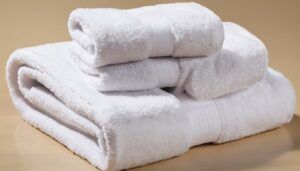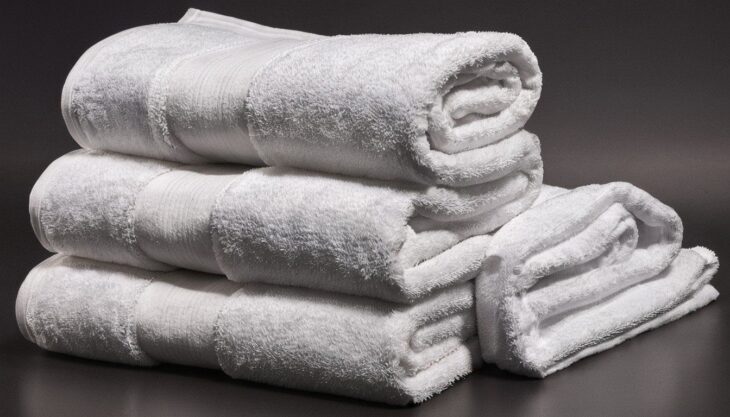The Role of the Terry Towel for the Hospitality Industry
Terry towels, often an underrated aspect of the hospitality industry, play a crucial role in enhancing the overall guest experience. In this article, we’ll delve into the various dimensions of these versatile towels, exploring their types, applications, maintenance, and the ever-evolving trends in the hospitality sector.
1. Introduction
Terry towels have a fundamental and transforming function in the complex fabric of the hospitality business, where every little detail counts. A soft bath towel’s embrace greets visitors as soon as they enter their rooms, establishing the mood for the rest of their stay. With a history spanning centuries, terry towels have developed from being merely cloth to become indispensable components of comfort and luxury in contemporary hospitality. This growth reflects both the constantly evolving demands of discriminating guests and the progress made in textile technology. In addition to being functional, terry cloth has symbolic meaning. It represents indulgence, cleanliness, and the host’s dedication to making sure guests are happy.
Importance of Towels in the Hospitality Industry
In the hospitality sector, towels are essential cornerstones that quietly convey luxury, comfort, and cleanliness. Towels greet visitors as soon as they enter their rooms, promising rest and refreshment. Towels are not just useful for drying and cleaning; they also have great symbolic value that reflects the level of hospitality that a place of business maintains. Towels have a major impact on client happiness in bathrooms and other areas, making a lasting impression on their whole experience. Luxurious bath towels and stylish hand towels convey a great deal about the level of attention to detail in an organization through their quality and presentation. Towels are more than just practical; they are a symbol of kindness and welcome.
Different Materials Used
When it comes to producing towels, different materials are used to meet the demands and tastes of different segments of the hotel business. Towels made of cotton are the most popular because of its famed softness, absorbency, and durability. Towels of remarkable quality and luxury are produced from Egyptian cotton, which is renowned for its long fibers. Notable for its antibacterial and environmentally friendly qualities, bamboo-derived textiles are becoming more and more popular as sustainable substitutes for conventional cotton towels. Made of synthetic fibers, microfiber towels are valued for their lightweight feel and ability to dry quickly. Furthermore, blends that offer economy and durability combine the greatest qualities of polyester and cotton. Less frequently used, yet highly preferred for their excellent absorbency and organic feel, linen towels are perfect for spa environments.
3. Features That Make Terry Towels Ideal for Hospitality
Absorbency
Terry towels are perfect for hospitality companies because of their many qualities, which meet the specific needs of visitors. Their soft, looped texture adds a luxuriant feel that exudes luxury and relaxation while also improving absorbency. Because terry towels are made from premium cotton, their durability is guaranteed, allowing them to survive repeated washings without losing their softness or integrity. Because of their adaptability, they may be used for a variety of tasks, such as adding some elegance to guest bathrooms or drying off after a revitalizing shower. Terry towels are excellent at upholding hygienic standards because of their capacity to wick away moisture and germs.

4. Applications in the Hospitality Industry
Terry towels are widely used in the hotel sector and are crucial components in raising the level of comfort and satisfaction of visitors. After a long day of traveling or exploring, guests can unwind with a calming experience from the soft and opulent bath towels in their suites. When hand towels are positioned strategically next to sinks, visitors may refresh up with ease and hygiene. Soft terry robes in spas and wellness centers cocoon visitors in comfort, encouraging indulgence and rest. Pool towels, made specifically for use by the pool, provide flair and utility to recreational spaces while also improving the atmosphere overall. Furthermore, terry towels are used in restaurants, where they are used as classy tablecloths or napkins to elevate the eating experience.
5. Choosing the Right Terry Towels
When selecting the right terry towels, hospitality firms need to carefully consider a number of factors in order to achieve optimal levels of client satisfaction and operational effectiveness. The most crucial factor to take into account is the towels’ quality; factors like the type of fabric, density, and finishing methods influence how soft, durable, and absorbent the towels are. Establishments need to take into account the surroundings as well as the specific needs of their customers when choosing towels that are the appropriate weight and size for different applications. Color and design are additional crucial components in creating cohesive aesthetics that enhance the establishment’s ambiance and brand image. The growing significance of sustainability concerns has led to an increase in the use of ecologically friendly materials and industrial practices.
6. Maintenance Tips for Terry Towels
In hospitality environments, maintaining the longevity and quality of terry towels requires proper care. Towels can be kept soft and absorbent by regularly laundering them in mild detergent, which also helps to get rid of bacteria and grime. To guarantee complete cleaning and avoid damaging the towels, washing machines must not be overloaded. Color fading and shrinkage can be avoided by washing in warm water and rinsing in cool water. Furthermore, using moderate or delicate cycles reduces abrasion on the towels. By avoiding the use of bleach and fabric softeners, residue accumulation is avoided and natural fibers are preserved. Either tumble dry on low heat or thoroughly dry in a well-ventilated place will keep the fluffy texture and stop mildew from growing.
7. Cost-Effectiveness of Terry Towels
Terry towels are economical in hospitality settings when they balance the initial investment with long-term advantages. Premium towels may cost more up front, but over time, costs will go down because they won’t need to be replaced as frequently because of their durability and longevity. Furthermore, because premium terry towels are more absorbent and dry faster, they use less detergent and wash cycles, which reduces laundry costs. A durable towel purchase also lessens the chance that soiled or poor quality towels would make customers upset, safeguarding the company’s reputation and profits. Towels that are the proper weight and size also ensure economical resource utilization while meeting guest expectations. Cost-effectiveness was increased by prolonging the life of terry towels with proper care methods.
8. Eco-Friendly Options in Terry Towels
The hotel industry is seeing a rise in demand for eco-friendly terry towel solutions as sustainability becomes more and more essential. Compared to regular cotton towels, organic cotton towels are cultivated without the use of artificial fertilizers or pesticides, making them a more environmentally responsible choice. Another eco-friendly option are textiles made from bamboo, which grows swiftly and needs little water or chemicals to thrive. By recycling existing materials, recycled cotton towels, made from post-consumer or post-industrial cotton waste, lessen the environmental impact of textile production. Towels with environmentally friendly treatments and colors also utilize less hazardous chemicals and other pollutants during production. By putting these environmentally friendly solutions into practice, hospitality businesses can show their dedication to sustainability and lessen their carbon footprint all while offering their customers plush, premium terry towels.
9. Trends in Terry Towels for Hospitality
The tastes and requirements of its clientele influence changes in the terry towel trends in the hospitality industry. Hotels are aiming to create a sense of exclusivity and intimacy by providing branded towels or towels bearing their name. Customization is becoming a more popular trend. Due to the increasing demand for eco-friendly solutions, hotels are also investing in towels made from organic or recycled materials in order to meet sustainability criteria. Furthermore, innovative features and designs are beginning to surface, such as rapid drying periods or antimicrobial towels that enhance convenience and hygiene. In response to the needs of modern travelers, a trend toward lighter, more compact towels that are simpler to wash and pack into luggage is also expanding.
10. Customer Satisfaction and Terry Towels
The quality and experience of terry towels offered to visitors has a direct impact on customer satisfaction in the hotel sector. The comfort and general happiness of guests are greatly enhanced by soft, velvety, sumptuous, absorbent towels. Towels play a crucial role in forming opinions and fostering loyalty since visitors frequently rely their opinions about an establishment’s cleanliness and attention to detail on the quality of the towels offered. Exceeding guest expectations with high-quality towels can create a lasting impression, generate favorable reviews, and encourage repeat business. On the other hand, shoddy or worn-out towels might cause complaints and bad reviews, which could harm the business’s reputation. In order to ensure maximum visitor happiness and loyalty in the cutthroat hospitality sector, it is imperative to invest in premium terry towels and maintain them to the highest standards.
11. Challenges in Maintaining Towel Quality
Establishments have a number of obstacles to overcome in order to maintain towel quality in hospitality settings and guarantee visitor happiness. Towel wear and tear over time might be exacerbated by the regular laundering needed to maintain cleanliness and hygienic conditions. Decreased softness and absorbency may arise from overflowing washing machines or using strong detergents, which can worsen the problem. It can also be difficult to guarantee uniform quality in big batches of towels, particularly when procuring from several vendors. Logistically challenging issues can also arise from storing and controlling towel inventories, especially during periods of strong demand. Keeping towels from being stolen or lost is another ongoing problem that necessitates businesses to put strong security and monitoring systems in place.
12. Addressing Hygiene Concerns
A broad approach is required to handle hygiene challenges in the hospitality business and guarantee the safety and well-being of guests. To fully clean and sanitize towels, strict laundry procedures are necessary, such as the use of hot water and disinfecting chemicals. Maintaining hygiene requirements and preventing contamination are made easier with routine laundry equipment inspections and maintenance. Providing guests with explicit instructions on how to use and discard towels promotes good conduct and reduces the possibility of cross-contamination. While producing towels, using quick-drying technologies or antimicrobial treatments improves the towels’ hygienic properties by reducing the formation of bacteria.


Good job
Gd
Osm
Good